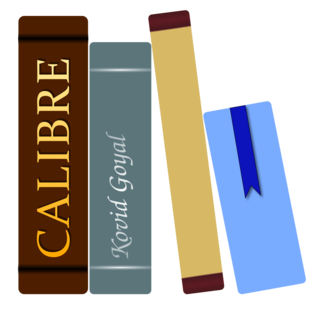Digital distribution, also referred to as content delivery, online distribution, or electronic software distribution, among others, is the delivery or distribution of digital media content such as audio, video, e-books, video games, and other software.
Open eBook (OEB), or formally, the Open eBook Publication Structure (OEBPS), is a legacy e-book format which has been superseded by the EPUB format. It was "based primarily on technology developed by SoftBook Press". and on XML. OEB was released with a free version belonging to public domain and a full version to be used with or without DRM by the publishing industry.

The Sony Reader (ソニー・リーダー) was a line of e-book readers manufactured by Sony. The first model was the PRS-500 released in September 2006 and was related to the earlier Sony Librie, the first commercial E Ink e-reader in 2004 using an electronic paper display developed by E Ink Corporation. The last model was the PRS-T3, after which Sony announced it would no longer release a new consumer e-reader.
Mobipocket SA was a French company incorporated in March 2000 that created the .mobi e-book file format and produced the Mobipocket Reader software for mobile phones, personal digital assistants (PDA) and desktop operating systems.
Baen Ebooks is an e-book supplier operated by Baen Books. It sells e-books for Baen and some other publishers, as well as hosting the Baen Free Library. Unlike most e-book suppliers, it does not use Digital Rights Management. Purchasers can download the same e-book in seven different formats, even long after the initial purchase. Their range of genres offered is heavy on science fiction and fantasy.

Adobe Digital Editions is an e-book reader software program from Adobe. It is used for acquiring, managing, and reading e-books, digital newspapers, and other digital publications. The software supports EPUB and PDF. It implements a proprietary scheme of digital rights management (DRM) which, since the version 1.5 release in May 2008, allows document sharing among multiple devices and user authentication via an Adobe ID. Digital Editions is a successor to the Acrobat eBook Reader application.
The following is a comparison of e-book formats used to create and publish e-books.

Digital rights management (DRM) is the management of legal access to digital content. Various tools or technological protection measures (TPM), such as access control technologies, can restrict the use of proprietary hardware and copyrighted works. DRM technologies govern the use, modification and distribution of copyrighted works and of systems that enforce these policies within devices. DRM technologies include licensing agreements and encryption.

Accessible publishing is an approach to publishing and book design whereby books and other texts are made available in alternative formats designed to aid or replace the reading process. It is particularly relevant for people who are blind, visually impaired or otherwise print-disabled.
Fictionwise, owned by Barnes & Noble since 2009, was one of the largest electronic book sellers in North America with an estimated 1.5 million ebook content units sold in 2008. Fictionwise sold both DRM-encrypted and unencrypted (DRM-free) ebooks in various formats that were compatible with computers as well as a wide range of eBook devices, PDAs, and Smartphones.

EPUB is an e-book file format that uses the ".epub" file extension. The term is short for electronic publication and is sometimes stylized as ePub. EPUB is supported by many e-readers, and compatible software is available for most smartphones, tablets, and computers. EPUB is a technical standard published by the International Digital Publishing Forum (IDPF). It became an official standard of the IDPF in September 2007, superseding the older Open eBook (OEB) standard.

Calibre is a cross-platform free and open-source suite of e-book software. Calibre supports organizing existing e-books into virtual libraries, displaying, editing, creating and converting e-books, as well as syncing e-books with a variety of e-readers. Editing books is supported for EPUB and AZW3 formats. Books in other formats like MOBI must first be converted to those formats, if they are to be edited. Calibre also has a large collection of community contributed plugins.

An ebook, also spelled as e-book or eBook, is a book publication made available in electronic form, consisting of text, images, or both, readable on the flat-panel display of computers or other electronic devices. Although sometimes defined as "an electronic version of a printed book", some e-books exist without a printed equivalent. E-books can be read on dedicated e-reader devices, also on any computer device that features a controllable viewing screen, including desktop computers, laptops, tablets and smartphones.

The Nook 1st Edition is the first generation of the Nook e-book reader developed by American book retailer Barnes & Noble, based on the Android platform. The device was announced in the United States in October 2009 and was released the next month. The Nook includes Wi-Fi and AT&T 3G wireless connectivity, a six-inch E Ink display, and a separate, smaller color touchscreen that serves as the primary input device. In June 2010 Barnes & Noble announced a Wi-Fi-only model of the Nook. On June 5, 2018 Barnes and Noble announced support for logging in to BN.com and adding new content to the device will end on June 29, 2018. The second-generation Nook, the Nook Simple Touch, was announced on May 25, 2011 with a June 10 release date.

Lucifox is a discontinued free and open source add-on for the browser Mozilla Firefox that manages, downloads and displays e-books. It supports EPUB 3 and EPUB 2 formatted books without digital rights management (DRM) and retrieval of books from online book catalogues using the Open Publication Distribution System (OPDS). It is part of the Lucidor suite of free and open source e-book software made by the Swedish developer Ordbrand.
Pubsoft is a cloud-based eBook publishing platform headquartered in Houston, Texas. It serves as the publishing engine for Kbuuk, LLC, a self-publishing software company that provides digital conversion, distribution and marketing services for authors. Pubsoft is designed to allow publishers to create and manage an online eBook store for direct consumer sales. Publishers can also use Pubsoft to handle social media marketing, deliver eBooks to mobile devices, manage author and reader relationships and distribute royalties through an administrative portal that uses PayPal.

Google Play Books, formerly Google eBooks, is an ebook digital distribution service operated by Google, part of its Google Play product line. Users can purchase and download ebooks and audiobooks from Google Play, which offers over five million titles, with Google claiming it to be the "largest ebooks collection in the world". Books can be read on a dedicated Books section on the Google Play website, through the use of a mobile app available for Android and iOS, through the use of select e-readers that offer support for Adobe Digital Editions, through a web browser and reading via Google Home. Users may also upload up to 2,000 ebooks in the PDF or EPUB file formats. Google Play Books is available in 75 countries.

FBReader is an e-book reader for Linux, Microsoft Windows, Android, and other platforms.
Kindle File Format is a proprietary e-book file format created by Amazon.com that can be downloaded and read on devices like smartphones, tablets, computers, or e-readers that have Amazon's Kindle app. E-book files in the Kindle File Format originally had the filename extension .azw; version 8 (KF8) introduced HTML5 & CSS3 features and have the .azw3 extension, and version 10 introduced a new typesetting and layout engine featuring hyphens, kerning, & ligatures and have the .kfx extension.









